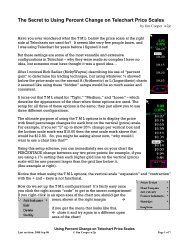The New York Times Magazine, Sunday, August 22, 1999
The New York Times Magazine, Sunday, August 22, 1999
The New York Times Magazine, Sunday, August 22, 1999
Create successful ePaper yourself
Turn your PDF publications into a flip-book with our unique Google optimized e-Paper software.
<strong>The</strong> Bully in the Mirror<br />
camp or the beach and having to appear in public without a shirt.<br />
fter Alexander finished his workout that hot July day, we stopped to get<br />
something to drink at the gym's cafe. "I feel pretty good right now,"<br />
Alexander admitted, "and I was furious when I went in there." It turned out<br />
that the night before, he had a conversation with a girl that took a decidedly<br />
unsatisfying turn at the end.<br />
At a time when the collective amount of American body fat is enough to stretch<br />
the jaws of Skip Pope's calipers from coast to coast, when so many adults amble<br />
about like fatted calves and so many children are little more than couch potatoes<br />
in training, it's hard to find fault with disciplined, drug-free efforts by teen-age<br />
boys to add a bit of muscle; weight lifting is not a sport with shortcuts, and it has<br />
become an essential adjunct to contemporary athletic performance. But there is a<br />
psychological side to all this heavy lifting that may be as unhealthy and<br />
undermining on the inside as it seems fit on the outside. And it resides not in that<br />
telltale mirror, but in how we see ourselves.<br />
"I look in the mirror and I don't see what other people see," Alexander told me.<br />
"I look in the mirror, and I see my flaws. People go, 'Oh, you're narcissistic.' I<br />
go, 'No, I was looking at how uneven my pecs are,' although I know that in<br />
reality, they're, like, a nanometer off. And I have three friends who do exactly<br />
the same thing. <strong>The</strong>y look and they go, 'Look how uneven I am, man!' And I go:<br />
'What are you talking about! <strong>The</strong>y look pretty even to me.' It's not narcissism -it's<br />
lack of self-esteem."<br />
I'm not so worried about kids like Alexander -- he clearly has demonstrated both<br />
the discipline to remake his appearance and the psychological distance not to<br />
take it, or himself, too seriously. But there will be many other boys out there who<br />
cannot hope to match the impossibly raised bar of idealized male body image<br />
without resorting to the physically corrosive effects of steroids or the<br />
psychologically corrosive effects of self-doubt. Either way, the majority of boys<br />
will be diminished by chasing after the golden few.<br />
Moreover, this male preoccupation with appearance seems to herald a dubious,<br />
regressive form of equality -- now boys can become as psychologically and<br />
physically debilitated by body-image concerns as girls have been for decades.<br />
After all, this vast expenditure of teen-age male energy, both psychic and kinetic,<br />
is based on the premise that members of the opposite sex are attracted to a retro,<br />
rough-hewn, muscular look, and it's a premise that psychologists who study boys<br />
have noticed, too. "While girls and women say one thing, some of them continue<br />
to do another," Pollack says. "Some of them are still intrigued by the old male<br />
images, and are attracted to them."<br />
http://www.nytimes.com/library/magazine/home/<strong>1999</strong>08<strong>22</strong>mag-boys-self-image.html (17 of 18) [8/<strong>22</strong>/<strong>1999</strong> 9:17:23 PM]






